 It was a great privilege to publish a special summer book list for the Center for Public Justice, the nonpartisan, always thoughtful, Washington DC-based, Christian political think-tank. It was a diverse list and included something for almost anyone interested in considering the nature of our public life; it was written with the CPJ audience in mind, but I think most BookNotes readers would like browsing through it. (Click here, to see my 10 short reviews, but don’t forget to come back!)
It was a great privilege to publish a special summer book list for the Center for Public Justice, the nonpartisan, always thoughtful, Washington DC-based, Christian political think-tank. It was a diverse list and included something for almost anyone interested in considering the nature of our public life; it was written with the CPJ audience in mind, but I think most BookNotes readers would like browsing through it. (Click here, to see my 10 short reviews, but don’t forget to come back!)
I like CPJ. Passionate about the unavoidable Biblical call to do justice, but working out of a somewhat different cultural and social approach than many other faith-based advocates in DC, CPJ’s Capitol Commentary offers essays that are attempting to transcend the predictable ping-pong back and forth between liberals and conservatives, trying to frame things in fresh and new ways. The book list I compiled and annotated for that column tows no party line, and I hope it was interesting and helpful.
I said they offer some new insights. Well, maybe not so new.
A robust social theory has been articulated by many in church history, preceding the current fascination with donkeys and elephants. From Augustine to Aquinas, Luther to Wesley, there have been robust, Biblically-shaped, and (sometimes) truly helpful theories about the implications of a Christian political vision. (The recent Catholic document about, among other things, climate change, 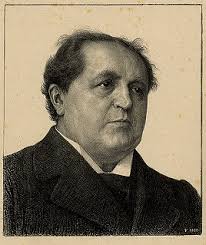 stands in a line of often remarkable encyclicals, sometimes moving Catholic Social Teaching forward in very interesting ways.) Although it is usually only in the background, CPJ draws somewhat on the Dutch theologian, journalist, and statesman, Abraham Kuyper – founder of a unique political party in the early 1900s which catapulted him to Prime Minister of Holland. His passion for social democracy, the poor and ignored, and a vibrant understanding of various kinds of institutions and honoring them through principled pluralism – religious liberty for all, protecting public space for a variety of views, so there could be feisty debate — lead to a social architecture and form of Parliament (called proportional representation) that some thing very relevant in our era when we talk so much about election reform. And religious liberty.
stands in a line of often remarkable encyclicals, sometimes moving Catholic Social Teaching forward in very interesting ways.) Although it is usually only in the background, CPJ draws somewhat on the Dutch theologian, journalist, and statesman, Abraham Kuyper – founder of a unique political party in the early 1900s which catapulted him to Prime Minister of Holland. His passion for social democracy, the poor and ignored, and a vibrant understanding of various kinds of institutions and honoring them through principled pluralism – religious liberty for all, protecting public space for a variety of views, so there could be feisty debate — lead to a social architecture and form of Parliament (called proportional representation) that some thing very relevant in our era when we talk so much about election reform. And religious liberty.
Kuyper is nearly a household world in some Presbyterian and Reformed traditions, and his theology and devotional books are still widely read. (His Lectures on Calvinism, first delivered at Princeton in 1898, remains a big seller!) His writings on common grace are being translated into English (the first in 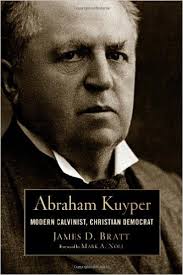 a series being Wisdom and Wonder: Common Grace for the Arts and Sciences.) The recently retired President of the world’s largest and most ethnically diverse seminary — Richard Mouw, of Fuller Theological Seminary in Pasadena, himself a PC(USA) Presbyterian — a year ago wrote a small introduction to why Kuyper matters (Abraham Kuyper: A Personal and Short Introduction) and Calvin College history professor James Bratt last year published the definitive book of the important man (Abraham Kuyper:Modern Calvinist, Christian Democrat.) Dordt College Press released a major collection of mostly academic essays in a reader called On Kuyper. And, of course, we have them.
a series being Wisdom and Wonder: Common Grace for the Arts and Sciences.) The recently retired President of the world’s largest and most ethnically diverse seminary — Richard Mouw, of Fuller Theological Seminary in Pasadena, himself a PC(USA) Presbyterian — a year ago wrote a small introduction to why Kuyper matters (Abraham Kuyper: A Personal and Short Introduction) and Calvin College history professor James Bratt last year published the definitive book of the important man (Abraham Kuyper:Modern Calvinist, Christian Democrat.) Dordt College Press released a major collection of mostly academic essays in a reader called On Kuyper. And, of course, we have them.
The legacy of Abraham Kuyper has been helpful for people like CPJ who have for decades been thinking and writing and organizing for public justice in light of some of Kuyper’s 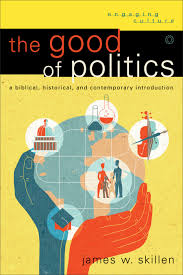 intellectual contributions, lessons learned by the Christian democratic traditions in Europe (and its misappropriation and failure in South Africa.) Some of the neo-Calvinist insights about pluralism in civil society, the legal needs of voluntary associations, the significance of religious liberty, even as the State insures justice for all, are, in my view, important. CPJ’s retired founder, James Skillen, explored much of this in his hefty 2014 book The Good of Politics: A Biblical, Historical, and Contemporary introduction. I still get fired up by the street-level activism of Sojo or my friends at Evangelicals for Social Action, and I still read the heady and very thoughtful work coming from classic conservative sources such as First Things or the IRD. But CPJ brings a voice and emphasis that is valuable.
intellectual contributions, lessons learned by the Christian democratic traditions in Europe (and its misappropriation and failure in South Africa.) Some of the neo-Calvinist insights about pluralism in civil society, the legal needs of voluntary associations, the significance of religious liberty, even as the State insures justice for all, are, in my view, important. CPJ’s retired founder, James Skillen, explored much of this in his hefty 2014 book The Good of Politics: A Biblical, Historical, and Contemporary introduction. I still get fired up by the street-level activism of Sojo or my friends at Evangelicals for Social Action, and I still read the heady and very thoughtful work coming from classic conservative sources such as First Things or the IRD. But CPJ brings a voice and emphasis that is valuable.
DR. VINCENT BACOTE – Speaker at the Fourth Annual Hearts & Minds Pittsburgh Summer Lecture
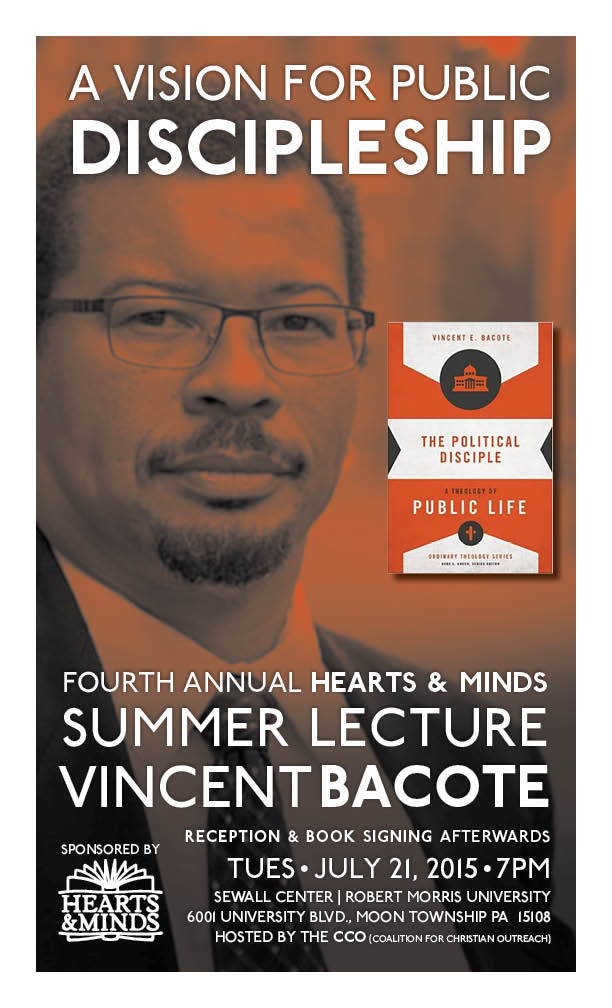 I think one of the great voices that have helped us think about all this stuff is Dr. Vincent E. Bacote, associate professor of Theology and the Director of the Center for Applied Christian Ethics at Wheaton College in Wheaton Illinois. I listed his new little book, The Political Disciple: A Theology of Public Life (Zondervan; $11.99) in that CPJ list which I mentioned above, and I want to tell you more about it now.
I think one of the great voices that have helped us think about all this stuff is Dr. Vincent E. Bacote, associate professor of Theology and the Director of the Center for Applied Christian Ethics at Wheaton College in Wheaton Illinois. I listed his new little book, The Political Disciple: A Theology of Public Life (Zondervan; $11.99) in that CPJ list which I mentioned above, and I want to tell you more about it now.
And, not only do I want to commend this book to you, I want to invite you to purchase an autographed copy which we can get for you when we host Dr. Bacote at the Fourth Annual Hearts & Minds Pittsburgh Summer Lecture this coming Tuesday, July 21, 2015.
Each summer we sponsor a public event with our friends in the CCO in Pittsburgh that brings a renowned author who has written about public life, developing a gracious Christian vision of cultural renewal, an author who represents potent but accessible Christian scholarship. CCO in its early days came under the influence of a Dutch Kuyperian philosophy professor and evangelist which has shaped some of the vision and uniqueness of CCO as a campus ministry, seen, for instance, in the amazing Jubilee conference for collegiates. Partnering with them for a Summer gathering helps underscores their vision of wide-as-life redemption and an intentionally Christian contribution to social and cultural reformation.
And this year, Bacote’s our man.
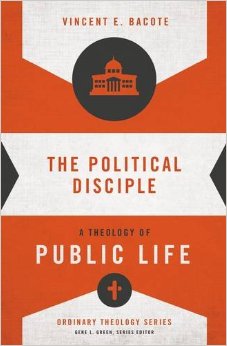 If you are anywhere near Eastern Ohio or Western Pennsylvania on Tuesday, July 21, 2015, we invite you to this free lecture, conversation, and reception for our guest author. It is free and open to the public, held on the campus of Robert Morris University (out by the airport, if you know Allegheny County. We’ll have a very large book display there, too.)
If you are anywhere near Eastern Ohio or Western Pennsylvania on Tuesday, July 21, 2015, we invite you to this free lecture, conversation, and reception for our guest author. It is free and open to the public, held on the campus of Robert Morris University (out by the airport, if you know Allegheny County. We’ll have a very large book display there, too.)
If you can’t make it, but would like a signed copy of his book, just let us know to whom it should be inscribed, if you want it signed to a particular person.
Dr. Bacote is a great presenter, a fun and friendly guy with quite a story. His new book is a lovely little paperback, and it would be a fine resource to use in an adult education class, a book club, small group, or, if you could start one, a Christian citizen’s group that meets to explore political theology. Just under 100 pages, it is designed to be thoughtful but brief, interesting, and a guide to living out Christian faith in ordinary ways.
The Political Disciple is, in fact, part of a new series of short books that I have mentioned before, called the “Ordinary Theology Series.” So far, the series includes a book on a Christian view of medicine and 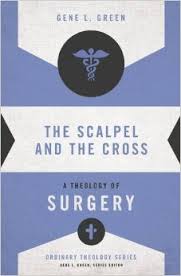
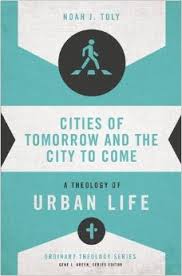
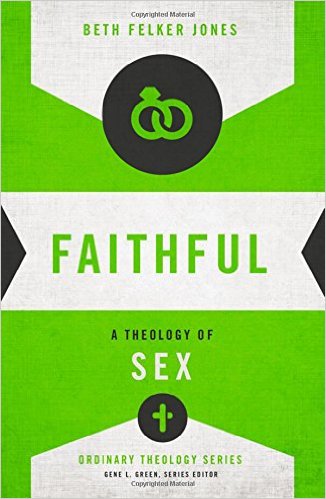 the experience of surgery (The Scalpel and the Cross), one on new urbanism and a theology of urban life (The Cities of Tomorrow and the City of the Future), and an excellent one on sexuality called Faithful. And Vince’s on citizenship, politics, and public life. Taken together, these illustrate something very important to us here at the bookstore: we value resources like this, books that are not sentimental or merely inspirational, but not arcane and technical, either. They are about vital issues, illustrating how the gospel is relevant for al of life. They are stimulating but brief. I’m so glad for such guides to thinking about the real world and what it looks like to live before God in God’s world, in ways that are coherent, meaningful, and theologically-informed and which can bear fruit in cultural flourishing.
the experience of surgery (The Scalpel and the Cross), one on new urbanism and a theology of urban life (The Cities of Tomorrow and the City of the Future), and an excellent one on sexuality called Faithful. And Vince’s on citizenship, politics, and public life. Taken together, these illustrate something very important to us here at the bookstore: we value resources like this, books that are not sentimental or merely inspirational, but not arcane and technical, either. They are about vital issues, illustrating how the gospel is relevant for al of life. They are stimulating but brief. I’m so glad for such guides to thinking about the real world and what it looks like to live before God in God’s world, in ways that are coherent, meaningful, and theologically-informed and which can bear fruit in cultural flourishing.
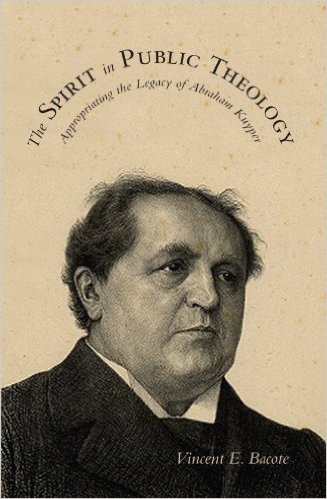 Dr. Bacote has edited several other theological works and contributed chapters to many published volumes. He made a tremendous contribution to Kuyper studies when he published his first book, The Spirit in Public Theology: Appropriating the Legacy of Abraham Kuyper (Wipf & Stock; $20.00.) He is obviously a serious scholar and a formidable thinker. With this nice, new volume in the “Ordinary Theology Series” Bacote has shown how he can guide beginners into thinking faithfully about our civic lives, serving in the public square, and what it means to be a citizen of a particular place and State, even as we inhabit the Kingdom of God and are disciples of the King Jesus.
Dr. Bacote has edited several other theological works and contributed chapters to many published volumes. He made a tremendous contribution to Kuyper studies when he published his first book, The Spirit in Public Theology: Appropriating the Legacy of Abraham Kuyper (Wipf & Stock; $20.00.) He is obviously a serious scholar and a formidable thinker. With this nice, new volume in the “Ordinary Theology Series” Bacote has shown how he can guide beginners into thinking faithfully about our civic lives, serving in the public square, and what it means to be a citizen of a particular place and State, even as we inhabit the Kingdom of God and are disciples of the King Jesus.
Is there a tension between the Kingship of Christ and our political duties? Can we find joy in the world (even though James says that “friendship with the world” is evil?) What does it mean to be “in the world but not of it” and what implications are there for our political lives?
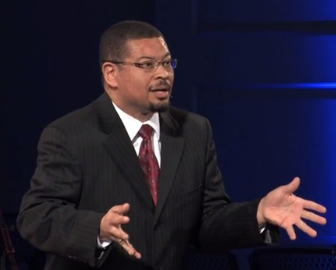 Bacote not only tells some fun stories about his own journey towards a nonpartisan, balanced (dare I say Kuyperian) political philosophy and about growing up in a typically Democrat African American home and how he felt realizing that many conventional White evangelicals saw things differently then his family did. Realizing that followers of Jesus shouldn’t just adopt whatever political persuasion they inherit from their family, He explains how chief Biblical themes and standard theological insights can shape and inform our public involvements.
Bacote not only tells some fun stories about his own journey towards a nonpartisan, balanced (dare I say Kuyperian) political philosophy and about growing up in a typically Democrat African American home and how he felt realizing that many conventional White evangelicals saw things differently then his family did. Realizing that followers of Jesus shouldn’t just adopt whatever political persuasion they inherit from their family, He explains how chief Biblical themes and standard theological insights can shape and inform our public involvements.
For instance, what political guidance can we glean from the notion that we are image bearers of God, created in the image of God? What might it mean that we are “children of Abraham” or “people of the covenant?” Many of us like to say that we are “followers of Jesus” but how does that identity inform our commitments to political parties or our governments?
 This second chapter of The Political Disciple: A Theology of Public Life – called “Identity and Allegiance” – is very nicely done, brief and not overly breathy. The implications are radical and far-reaching, but, unlike some authors, he lays it out calmly and helps us make up our own minds about some of the ways this might be worked out.
This second chapter of The Political Disciple: A Theology of Public Life – called “Identity and Allegiance” – is very nicely done, brief and not overly breathy. The implications are radical and far-reaching, but, unlike some authors, he lays it out calmly and helps us make up our own minds about some of the ways this might be worked out.
The next chapter offers a fresh take on political responsibilities – he invites to a posture of “holiness” and he invites us to ponder how the role of the Holy Spirit and the formation of virtue might influence our civic lives. Even more speaking about the Spirit, Bacote reminds us of our fundamental commitment to know God as a Trinity. That is, he is exploring the Trinitarian implications for our discipleship, and, therefore, the Trinitarian implications of living with our neighbors, in society. This way to lean in to our public roles and involvement in various spheres of society is a true delight and very insightful. Simply put, Biblically and theologically solid, it will make you think, and hopefully improve your own tendencies and styles of speaking and working in the public square. Bacote is a theologian and not trained as a political theorist, which, frankly, is good for a book like this. He is not only a teacher, but a public intellectual, offering deeply Christian insights for our life in the world, without getting needlessly drawn into technical debates about political science.
Many of who have been thinking about public discipleship and Christian views of politics will be glad for this introductory overview and Bacote’s ruminations on a theology of civic life. In his last chapter – “Perseverance: Staying in the Game” he shines, with hopeful, eloquent, and important guidance on handling the complexities, frustrations, and set-backs in our efforts to bear witness to God’s desire for human flourishing and public justice. We must, he says, “face our distress” and he offers some basic reminders about the role of lament, even as we endure political calamities and social injustices. True to form, Bacote is, again, reasonable and moderate in tone – he is not trying to manipulate readers to care more by shaming us or being “prophetic” by denouncing our pet idols. He offers clear-headed, sober, and wise counsel, moving us into deeper commitments, despite political rancor, to enduring Christian citizenship.
In his chapter on the posture of holiness, after exploring a great point that spirituality makes us more human and caring about the world than less, he reminds us,
Holiness is not supposed to be cloaked in the chambers of pious hearts but displayed in the public domains of home, school, culture, and politics. Because we continue to wait for the day that Christ sets all things in their proper order, we find the path of sanctification to be a challenge. Yet the Spirit bids us to listen to his voice and surrender to his power. If we heed this call and continue down the path of transformation, our private and public practice will produce more amazement than exasperation, and even our enemies will see that we act like those who are becoming human.
And, in a few very moving closing pages about the sacrifices and endure some of us may need as we bear witness to God’s shalom in political life, he writes,
The great temptation many of us face today is to leave the mess of the public square and find another way to be faithful, a way that may be less costly though maybe less spiritually valuable. To yield to such a temptation is to develop amnesia about our first commandment and commission. Lament, humility, and a cruciform perspective help us stay with our task in the face of frustration.
Buy The Political Disciple: A Theology of Public Life (or any of the “Ordinary Theology” series) at our sale price. If you want an autographed copy, let us know before Tuesday (7-21-2015) and to whom the book should be inscribed. We will try to get Vince to sign some for us to send out when we get back to D-town. Thanks!
BookNotes
DISCOUNT
ANY ITEM MENTIONED
20% off
order here
takes you to the secure Hearts & Minds order form page
just tell us what you want
inquire here
if you have questions or need more information
just ask us what you want to know
Hearts & Minds 234 East Main Street Dallastown, PA 17313 717-246-3333
